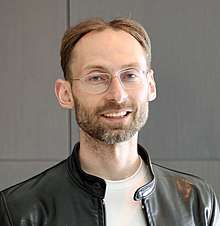Michael Bronstein
Michael Bronstein (b. 1980) is an Israeli computer scientist, entrepreneur, and investor. He is a professor at Imperial College London and University of Lugano and Head of Graph Learning Research at Twitter.
Michael Bronstein | |
|---|---|
 Michael Bronstein (2019) | |
| Born | |
| Nationality | Israeli |
| Alma mater | Technion |
| Known for | Geometric deep learning Non-rigid shape analysis Intel RealSense technology |
| Awards | IEEE Fellow 2018 IAPR Fellow, 2018 Royal Society Wolfson Research Merit Award, 2018 |
| Scientific career | |
| Fields | Computer Science |
| Institutions | Imperial College London, University of Lugano, Harvard University |
| Doctoral advisor | Ron Kimmel |
Biography
Bronstein received his PhD from the Technion in 2007. Since 2010, he has been a professor at the Institute of Computational Science, University of Lugano, Switzerland. In 2018, he took the Chair in Machine Learning and Pattern Recognition in the Department of Computing, Imperial College London.
Bronstein has held visiting appointments at Stanford University between 2009-2010, and at Harvard University and MIT between 2017-2018. He has been affiliated with the Radcliffe Institute for Advanced Study at Harvard University (as a Radcliffe fellow, 2017-2018), the Institute for Advanced Study at Technical University of Munich (as Rudolf Diesel industrial fellow, 2017-2019) and the Institute for Advanced Study in Princeton (as visitor, 2020).
Bronstein was a co-founder of the Israeli startup Invision, developing a coded-light 3D range sensor. The company was acquired by Intel in 2012 and has become the foundation of Intel RealSense technology. Bronstein served as Principal Engineer at Intel between 2012-2019, playing a leading role in the development of RealSense.
In 2018, Bronstein founded Fabula AI, a London-based startup aiming to solve the problem of online disinformation by looking at how it spreads on social networks. The company was acquired by Twitter in 2019.[1][2]
Work
Bronstein's research interests are broadly in theoretical and computational geometric methods for data analysis. His research encompasses a spectrum of applications ranging from machine learning, computer vision, and pattern recognition to geometry processing, computer graphics, and imaging. He is mainly known for his research on deformable 3D shape analysis and "geometric deep learning" (a term he coined), generalizing neural network architectures to manifolds and graphs.
Public Appearances
Bronstein was a speaker at TEDx Lugano 2019 (with Kirill Veselkov)[3] and the World Economic Forum 2015.[4]
Awards
- Prix de la Fondation Dalle Molle, 2018
- Royal Society Wolfson Research Merit Award, 2018
- IEEE Fellow, 2018
- IAPR Fellow, 2018
- ACM Distinguished Speaker, 2015
- World Economic Forum Young Scientist, 2014
- Hershel Rich Technion Innovation Award, 2003
Bronstein is also the recipient of five ERC grants and two Google Faculty Research awards.
Personal Life
Bronstein is married with one child and currently resides in London. He is the identical twin brother of Alex Bronstein.
Books
- "Numerical Geometry of Non-Rigid Shapes" (with Alex Bronstein and Ron Kimmel), Springer 2008.
References
- Spangler, Todd (3 June 2019). "Twitter Buys Artificial-Intelligence Startup to Help Fight Spam, Fake News and Other Abuse". Variety. Retrieved 2019-06-08.
- "Twitter Buys London Start-Up Fabula AI". Silicon UK. 3 June 2019. Retrieved 2019-06-08.
- "AI-designed HyperFood against cancer, TEDx Lugano 2019".
- "How to Build an Intelligent Machine, World Economic Forum 2015".